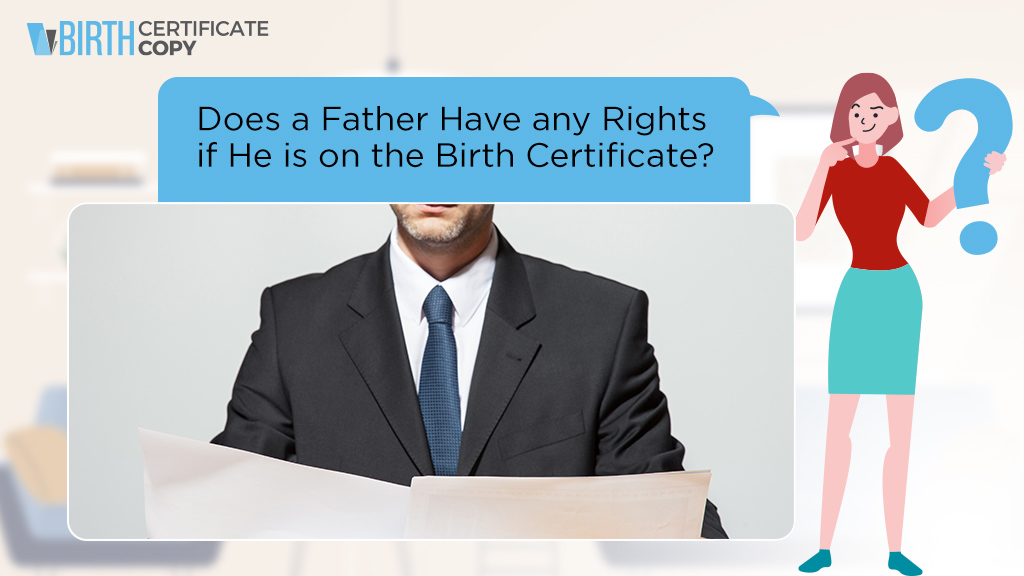When a father is listed on a child’s birth certificate, it establishes legal recognition of his parental rights and responsibilities. Being named on the birth certificate grants certain rights and privileges to the father, ensuring his involvement in the child’s life. In this article, we will explore the significance of a father’s name on a birth certificate, the rights it provides, and the implications it has on various aspects of family law. Let’s delve into the details!
The Importance of Being on a Child’s Birth Certificate
Being named on a child’s birth certificate holds significant legal implications for fathers. Here’s why it matters:
a. Establishing Paternity: By being listed on the U.S. birth certificate, the father’s legal relationship with the child is established, affirming his paternity. This recognition carries various legal rights and responsibilities.
b. Parental Rights: Being on the birth certificate grants the father certain parental rights, such as the right to make decisions about the child’s upbringing, including education, healthcare, and religious matters.
c. Custody and Visitation: A father named on the birth certificate has legal standing in custody and visitation matters. It allows him to seek custody or visitation rights through the appropriate legal channels.
Rights and Responsibilities of Fathers on a Birth Certificate
When a father’s name appears on a child’s birth certificate, he is entitled to specific rights and responsibilities. These may include:
a. Custodial Rights: The father has the right to seek custody of the child and play an active role in their upbringing. This includes making decisions regarding the child’s welfare, education, and healthcare.
b. Visitation Rights: If the father is not the custodial parent, he has the right to seek visitation rights to maintain a meaningful relationship with the child. The court typically aims to ensure the child has a healthy relationship with both parents.
c. Financial Obligations: The father has a legal responsibility to provide financial support for the child, including child support payments. These obligations ensure the child’s well-being and are determined based on state laws and guidelines.
Establishing Paternity
For fathers who are not automatically listed on the birth certificate, it is crucial to establish paternity legally. This step is necessary to secure the rights and responsibilities associated with being a father. There are several ways to establish paternity:
a. Voluntary Acknowledgment: Both parents can sign a voluntary acknowledgment of paternity form at the time of the child’s birth or afterward. This form legally establishes the father’s paternity and can be filed with the appropriate government agency.
b. Paternity Testing: If there is a dispute regarding paternity or if the father’s name was not included on the birth certificate, a paternity test may be necessary. This involves DNA testing to determine biological parentage.
Changing Your Child’s Birth Certificate
In some cases, it may be necessary to amend or change the information on a child’s birth certificate. This could involve correcting errors, adding the father’s name, or making other necessary updates. The process for changing a child’s birth certificate varies by jurisdiction, but typically involves the following steps:
a. Gather Documentation: Collect the required documentation, such as a court order establishing paternity, DNA test results, or any other relevant legal documents.
b. Submit an Application: Contact the vital records office in the state where the child’s birth certificate was issued and inquire about the process for changing or amending the certificate. They will provide you with the necessary forms and instructions.
c. Follow the Legal Process: Complete the application, provide the required documentation, and pay any applicable fees. It’s important to follow the specific procedures outlined by the vital records office to ensure a smooth and successful change to the birth certificate.
When a father’s name is included on a child’s birth certificate, it affirms his legal rights and responsibilities as a parent. It establishes paternity, grants certain parental rights, and ensures his involvement in custody, visitation, and decision-making matters. If you are not automatically listed on your child’s birth certificate, take the necessary steps to establish paternity and secure your rights through legal means. Remember, the laws regarding birth certificates and parental rights may vary by jurisdiction, so it’s important to consult with a legal professional to understand your specific situation and rights.
You can also check out: What information is on a birth certificate? Order your Birth Certificate

